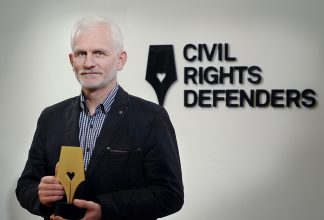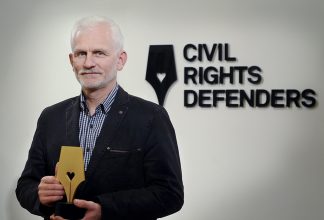No Public Manifestation During Minsk Pride
The ninth Pride festival in Minsk was recently arranged by the human rights organisation Gay Belarus. The event was aimed to consolidate the LGBT community and raise awareness about the difficult situation LGBT people face in the country. But instead of guaranteeing the participants’ right to freedom of assembly the authorities banned the planned manifestation in support of tolerance.
It was on the 9 December that the authorities decided to not allow the planned manifestation in support of tolerance towards the LGBT-community. The decision did not come as a surprise since the authorities have not allowed a single public action in support of LGBT in Belarus since 1999.
Earlier during the pride festival, on the 7 December, the police unexpectedly interrupted during a performance of the Belarus Free Theatre, as they had understood that it was a gathering of people with ‘non-traditional orientation’. Later on that evening the police raided the apartment serving as the headquarters of the organising committee of Minsk Pride, claiming that there were complaints about noise from the apartment. One of the members of Gay Belarus was taken to the police station only to be released. After this, a police car was placed outside the building in order to make sure that ‘unauthorised’ persons did not enter the apartment. Furthermore, the police announced a ban on LGBT-parties across the city, thereby cancelling the planned event at a club in Minsk on the same night.
“It is unacceptable that Belarusian authorities continue to violate the rights of LGBT in Belarus, denying them their freedom of assembly and freedom of expression. We call upon the Swedish and other EU-governments to put pressure on their Belarusian colleagues to respect the basic human rights of LGBT-people”, says Joanna Kurosz, Programme Director for Eastern Europe and Central Asia at Civil Rights Defenders.
The slogan of this year’s Pride, “We are”, refers to the LGBT community’s struggle for the right to exist. After Gay Belarus made its second attempt to register the organisation in the beginning of the year the Belarusian authorities initiated a campaign against the organisation by raiding gay clubs, stopping members at the border, interrogating them about their activities and the activities of their chairman, Siarhei Androsenka. Androsenka himself was forced to move from his apartment after the authorities put pressure on his landlord to evict him. The authorities’ pressure and restrictions on his civil liberties resulted in Androsenka temporarily leaving Belarus in June this year.


